The Joy of Giving
Posted on March 8, 2018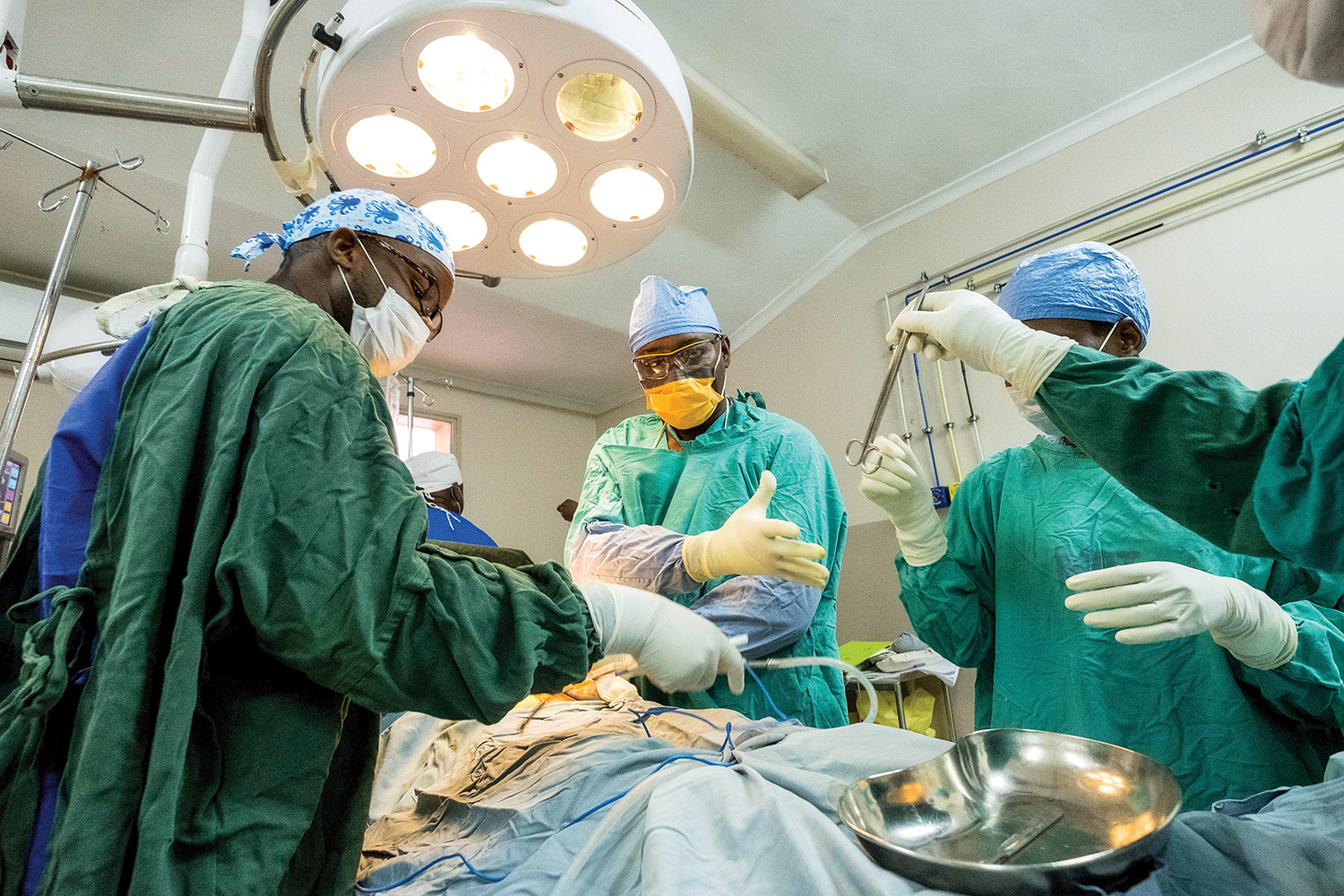
For two years, Dr. Anthony Charles (center) and others at UNC, in Malawi and at Haukeland University in Norway, collaborated to get Kamazu Central Hospital accredited as a surgical training site. (UNC photo by Jon Gardiner ’98)
AIDS no longer is the crisis it once was in Malawi — UNC helped see to that — but there’s a crying need for surgeons. Enter Dr. Anthony Charles ’09, laughing.
by Elizabeth Leland ’76
When Dr. Anthony Charles arrived in Malawi in 2008, hundreds of patients were squeezed into the wards at Kamuzu Central Hospital. Others were lying on metal cots along an open-air porch. There were few nurses, so family members kept vigil, changing bandages and cooking meals in a central courtyard.
In the operating room, one elderly surgeon scrubbed up to work.
Dr. Arturo Muyco was in his 80s, his hair white, his shoulders stooped. Day in and day out, he performed surgeries — thyroid, breast, abdominal, burns, whatever patients required. In the more than 20 years since he had moved to Malawi from the Philippines, Muyco watched well-meaning doctors, such as Anthony Charles ’09 (MPH), volunteer for a week or two and then leave.
He had two requests of the eager young trauma surgeon sent from Carolina. First: “Would you please do something much more long-lasting? We need to start a training program for Malawians to become surgeons.” And more immediately: “I want to take a couple of days off.”
So for the next three weeks, Charles operated, averaging 12 surgeries a day, whatever patients required. He stitched with silk because dissolvable sutures weren’t available. He postponed cases when the blood bank ran dry. He made do because there was no alternative. When he was called in to see patients at night, he was careful not to step on family members asleep beneath the cots.
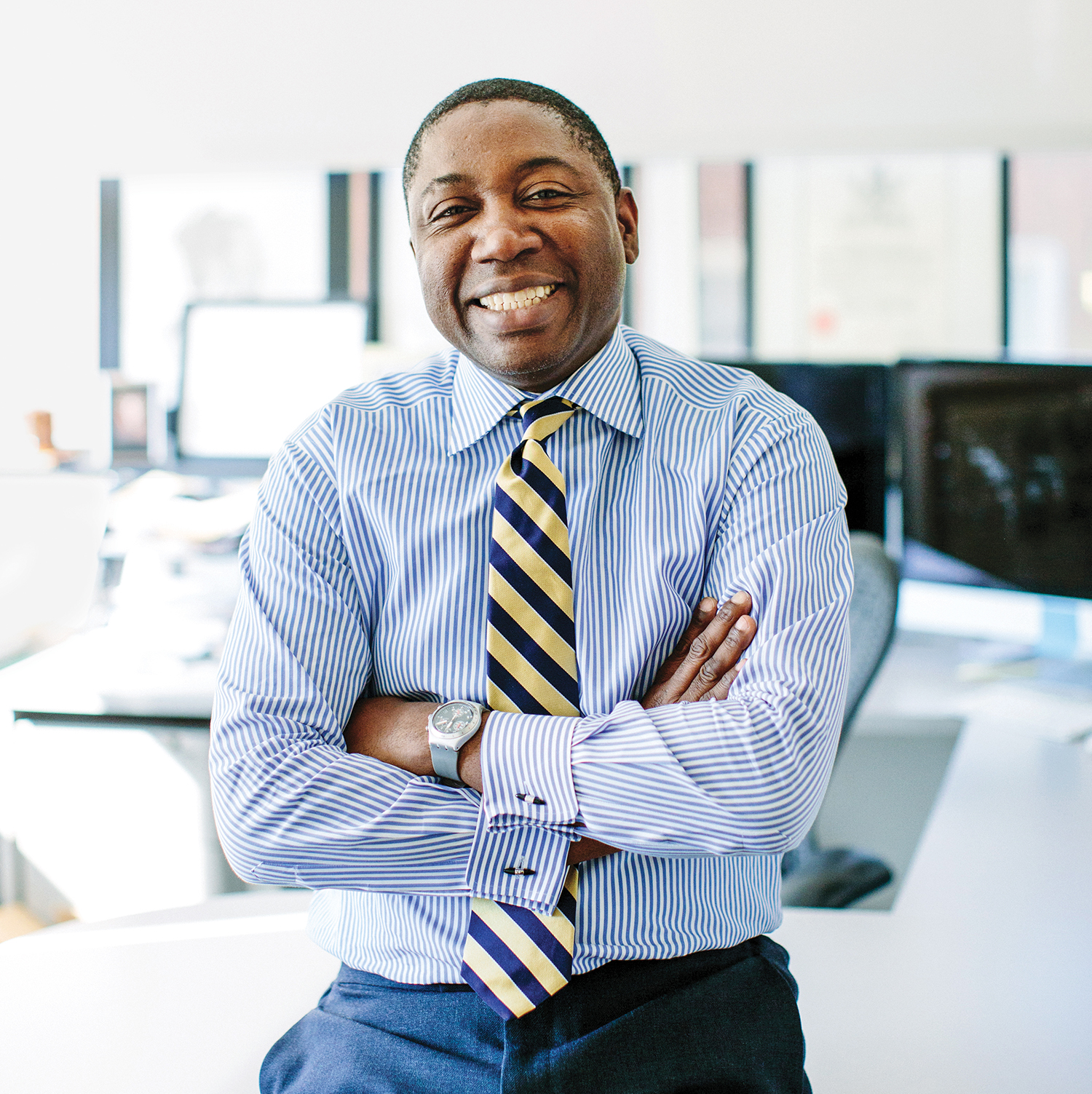
Dr. Anthony Charles ’09 (MPH). (Photo by Anna Routh Barzin ’07)
Despite the conditions — in fact, because of them — Charles left buoyed by the belief that Malawi had made him a better surgeon.
“You had to be very creative,” he said. “We’re used to a lot of technology here in the United States. I realized all I needed was a scalpel and I could achieve the same level of results.”
On the flight home, he began formulating a plan. UNC would set up a program at Kamuzu Central Hospital in the capital city of Lilongwe to train doctors to become surgeons — to help Malawi care for its own. Medical students and residents could volunteer and expand their understanding of surgery, and UNC could expand its research.
When Charles got back to Chapel Hill, where he is an associate professor in the department of surgery, his wife recognized “that twinkle” in her husband’s eye when he is excited about a new project. “He could see the opportunities for the good that could come out of it right away,” Celeste Charles said. “He could see beyond what was existing at the time.”
“A great need”
This was 10 years ago, when UNC already was a major presence in Malawi, one of the world’s poorest and least-developed countries, nestled near the east coast of Africa among Zambia, Mozambique and Tanzania.
Irving Hoffman ’94 (MPH) first traveled there in 1990, when the Malawi Ministry of Health asked the University to help develop a plan to treat sexually transmitted diseases. So many people were dying from HIV/AIDS then that carpenters had abandoned the furniture business to make coffins.
Over the years, UNC’s involvement expanded, from studying the deadly virus to treating patients infected by it.
UNC Project-Malawi was born.
Charles said he follows the wisdom of a favorite African proverb: “When two elephants fight, it is the grass that suffers.”
“Obviously, there was a great need,” said Hoffman, the program’s international director. “And also there were collaborators interested in working with us, and it was a safe place. So little by little, we got more activities through grants, and it just grew from the bottom up.”
One early study found that other sexually transmitted diseases, such as gonorrhea, could increase a patient’s ability to pass on HIV/AIDS. More recently, groundbreaking research led by Dr. Mike Cohen, director of UNC’s Institute for Global Health and Infectious Diseases, found that early treatment with antiretroviral therapy can reduce sexual transmission by a dramatic 96 percent.
“When HIV came along, the life expectancy in Malawi was in the high 50s,” Hoffman said. “After HIV came along, it dropped down to below 40. Now, with the antiretrovirals — a million people in Malawi are on them — life expectancy is back up to over 60.”
A deadly disease had become a chronic one, and people began getting cancers, diabetes, surgery-related problems and other noncommunicable diseases that come with longevity.
UNC decided to expand the medical complex in Malawi, Hoffman said, to “look more like the medical complex here at UNC. We reached out and joined partners with pediatricians and with surgeons and with the dental school, with pharmacy, with geography and radiology. Now we have training units and research units in all those areas.”
“We can do better”
Anthony Charles became involved at the request of the surgery department’s chair, who had a message from Cohen: “People are not dying from HIV anymore. People are dying from car crashes and trauma. We need a surgeon to go down there and check it out and see what we can do.”
Charles was relatively new at UNC, having joined the faculty two years earlier. But he was suited for the task. He grew up in Nigeria, where his parents were medical professionals. His father, a physician, had built a hospital in Lagos; his mother was a nurse midwife. Charles attended medical school there. At UNC, in addition to teaching and performing surgery, he was working toward a master’s in public health.
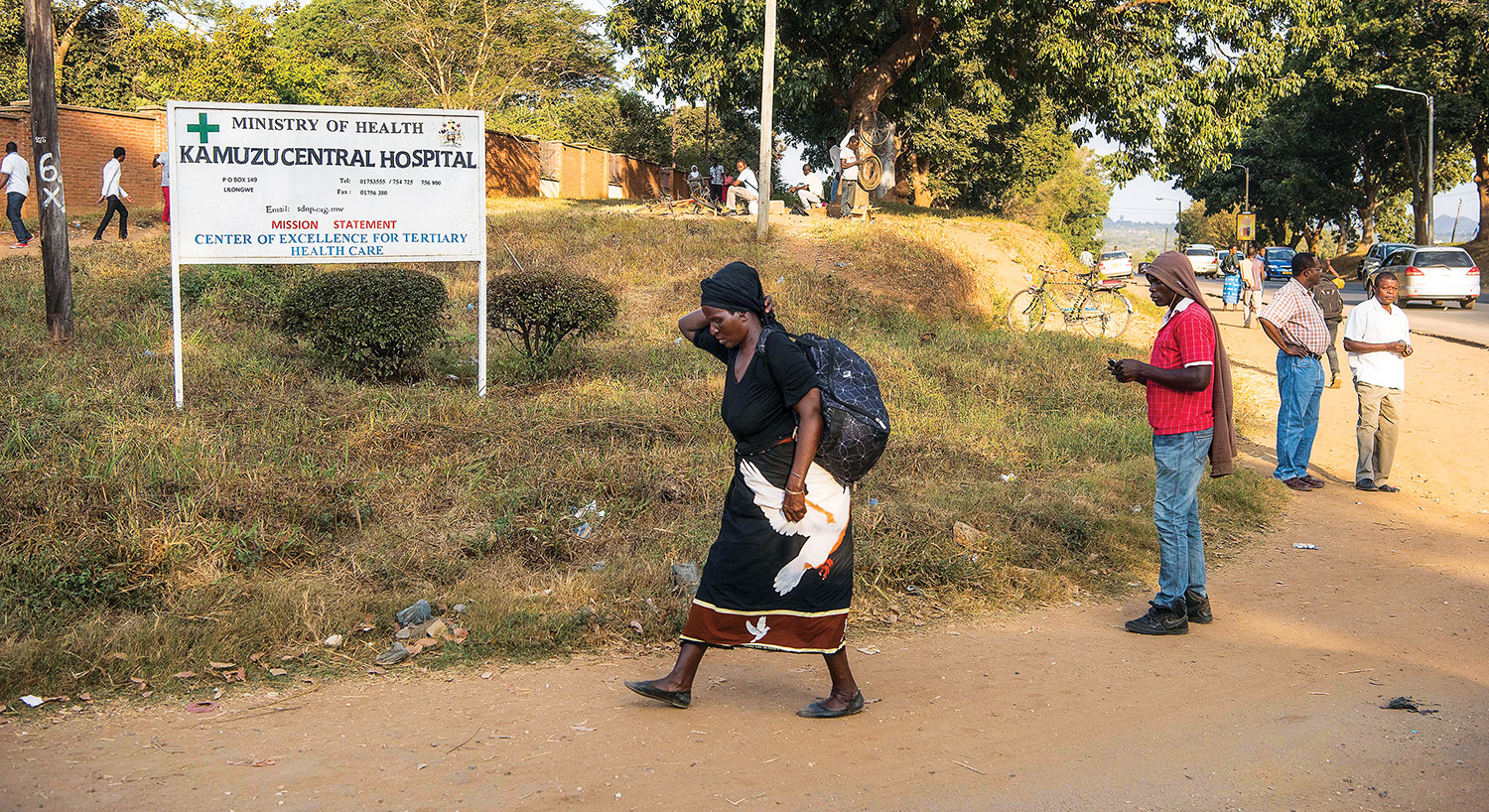
A scene outside Kamazu Central Hospital. (UNC photo by Jon Gardiner ’98)
On his first trip to Kamuzu Central Hospital, patients assumed Charles was from Malawi and spoke to him in their Chichewa language. He couldn’t understand. He speaks English in the lilting cadence of Nigeria, with a slight inflection of the more formal English spoken in Ireland, where he attended boarding school. He also speaks the Yoruba language of West Africa.
“I looked like them,” he said. “I understood their culture. But I still had to prove myself. They’ve seen a lot of people with different levels of skills come and go.”
That approach to surgery, he realized, was unsustainable.
“Ultimately no matter how hard I worked, I wasn’t going to make the type of impact that would be long lasting. Coming from an academic institution, I knew we can do better. And that’s why I bought into the idea very quickly that a long-lasting legacy of this old surgeon [Muyco] and UNC would be to have a training program.”
For two years, Charles and others at UNC, in Malawi and at Haukeland University in Norway, collaborated to get the hospital in Lilongwe accredited for surgical training. Clara Lee, now an associate professor at Ohio State University, was part of the team while she was on the UNC faculty.
“We built our surgical infrastructure on top of the infectious-disease infrastructure,” Lee said. “It really started from very little. A lot because of Anthony’s initiative and passion, it turned into something much bigger and more sustainable. Anthony helped build bridges to a number of different entities that were really important. When one is doing research or clinical care in a low-income country, you have to tread carefully and respect what’s already there and not just swoop in and build partnerships. Anthony realized that.”
He credits an unusual training ground: boarding school in Dublin. “You tend to be able to read people very well,” he said, “and figure out what their motivations are and try to get to the root of the problem.” In a moment of quiet self-reflection, he added, “I do have an incredible ability to be able to talk to people and smooth ruffled feathers and have everybody feeling that they’ve won.”
He said he follows the wisdom of a favorite African proverb: “When two elephants fight, it is the grass that suffers.”
He doesn’t want the surgical program to suffer.
“You had to be very creative. We’re used to a lot of technology here in the United States. I realized all I needed was a scalpel and I could achieve the same level of results.”
— Dr. Anthony Charles ’09 (MPH)
In the planning stage, as they confronted one obstacle after another, Lee said they met for hot chocolate every few weeks. “It seems like a random detail, but to me it sort of captures Anthony,” she said. “You’re in the trenches, you’re getting the work done, but he brings you a cup of hot chocolate. With Anthony, there’s always the human element and the joy element.”
His laugh is full-throated, his smile contagious. “Anthony has a joy of giving, almost to a fault,” Celeste Charles said about the man she married 19 years ago. “He truly loves to see success in other people. He doesn’t like the attention on himself. When he gets an award, he doesn’t mention it at home. At home, he’s just Anthony to me, he’s just Dad to the kids.”
To Dr. Carlos Varela, chief surgeon at Kamuzu Central Hospital, Charles is “a great UNC surgeon waving a Malawian flag.”
Before Charles undertook the project, the Malawi government spent $60,000 a year to send doctors to study surgery in South Africa or Europe. Many never returned, finding more lucrative jobs elsewhere. Malawi had only 14 trained surgeons for 15 million people.
“There are more Malawian doctors in Glasgow than there are in Malawi,” Charles said.
The Project Expands to Cancer and OB-GYN
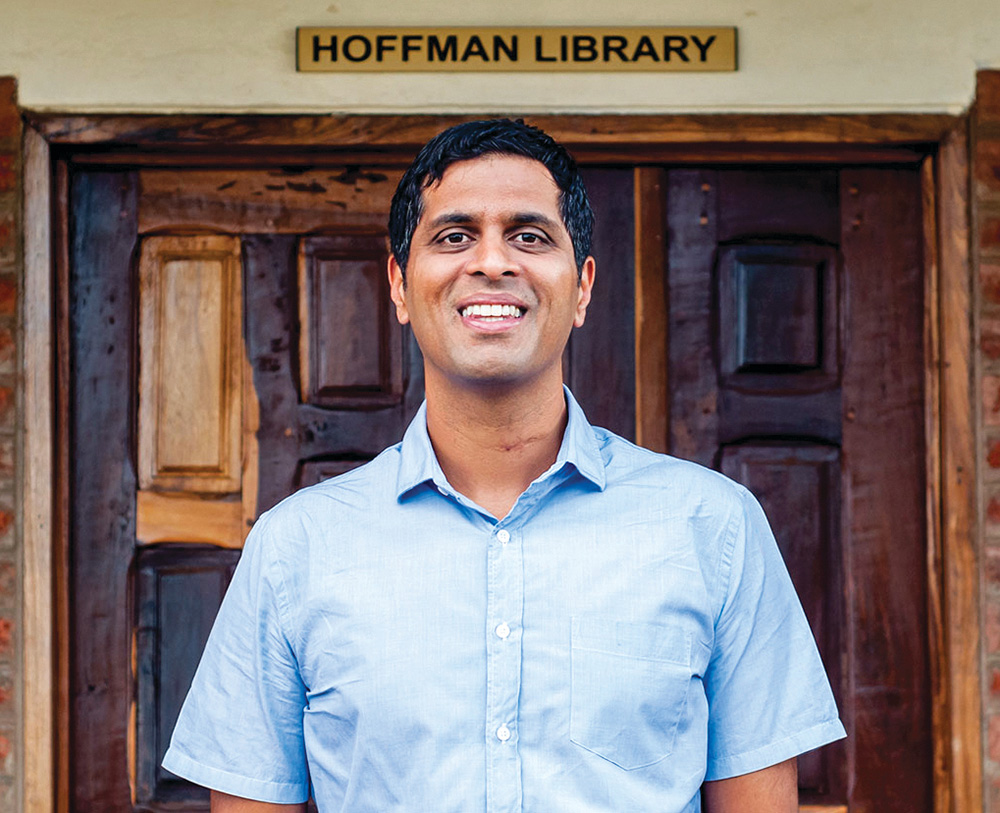
Dr. Satish Gopal ’97
While Dr. Anthony Charles was helping build the Malawi Surgical Initiative, UNC Project-Malawi was expanding in other areas, with a new OB-GYN residency program and a cancer program.
The project is now one of the largest employers in the capital city of Lilongwe, with 375 Malawians on its payroll. At any given time, there are at least 20 research studies underway and thousands of patients receiving treatment.
“We are all piggybacking on the HIV program because that’s where all the money and interest and activity came from originally,” said Satish Gopal ’97 (’00 MPH), who directs the cancer program. “As these different initiatives develop, we’re trying to find some sort of synergy.”
Researchers have the opportunity to study cancers in Malawi that rarely occur in the United States, Gopal said, and out of necessity they’re developing cost-effective ways to treat them. “We have the best cancer research in a low-income country in the world in Malawi,” he said by phone from Lilongwe. “It’s pretty exciting.”
Dr. Jennifer Tang ’12 (MSCR) moved to Malawi in 2012, about the same time as Gopal, to establish and run the OB-GYN residency program. Malawi has one of the highest maternal mortality ratios in the world, she said, but only 10 obstetric gynecologists.
“Now we have 19 residents,” said Tang, who returned to Chapel Hill in September. “So we’ll literally triple the number of OB-GYNs in the country.”
In another development, a Malawian doctor, Tisu Mvalo, returned after pediatric training in South Africa, which was funded by UNC, to run a pediatric care and research unit at Kamuzu Central Hospital.
Irving Hoffman ’94 (MPH), the international director of UNC-Project Malawi, is looking at what more needs to be done — from family planning to reducing infant mortality.
“To be involved in direct care and also public-health interventions is a global response that in our view is a responsibility of the University,” Hoffman said. “Training and direct care are ways we give back in addition to finding methods of reducing disease that have global implications.”
— Elizabeth Leland ’76
Even after the surgical training program became accredited, there was little incentive to stay. In Malawi, Charles said, medical officers earned $500 a month. “So what we did, we worked through the Ministry of Health and we said we will match it. We will give them an additional $500 stipend. So they make $1,000 a month, which is huge.”
The country now has about 29 surgeons, he said, double the number from 2008. Nine surgeons work at Kamuzu Central Hospital, and Muyco has retired.
As often has happened with UNC’s involvement in Malawi, one thing led to another. In 2011, the Malawi Surgical Initiative added a burn unit that is supported by the N.C. Jaycee Burn Center in Chapel Hill and Johnson & Johnson. Seventy percent of its patients are younger than 10.
“People usually eat, sleep and cook where they live, in the same room, in the same space,” Charles said. “It’s ground-level cooking, and children can crawl into the fire pits. Children can tip pots over because they’re not very stable. Burns are a big thing.”
Hoffman said he has “only high praise” for what Charles and the surgical initiative have accomplished. “Pediatric patients are surviving now, where, before the UNC unit was developed, they were definitely going to die.”
Husband, father, mentor
If UNC had not already been invested in Malawi, Charles expects he would have become involved in health care in Africa, most likely in his home country of Nigeria.
“There’s this level of guilt that Africans feel, particularly successful Africans that have emigrated, of wanting to give back to the continent. And I think this alleviates that guilt somewhat. It helped balance me in a way that being in America alone would not have done.”
His days in Chapel Hill are split among surgery, students, research — and family. Celeste Charles works as a CPA in Raleigh; their son is 16, their daughter 14. To manage his commitments, Anthony Charles sleeps only six hours a night and eats only a banana until supper time. A tinge of hunger, he said, keeps him focused. He doesn’t drink coffee. To relieve stress, he binge-watches Netflix.
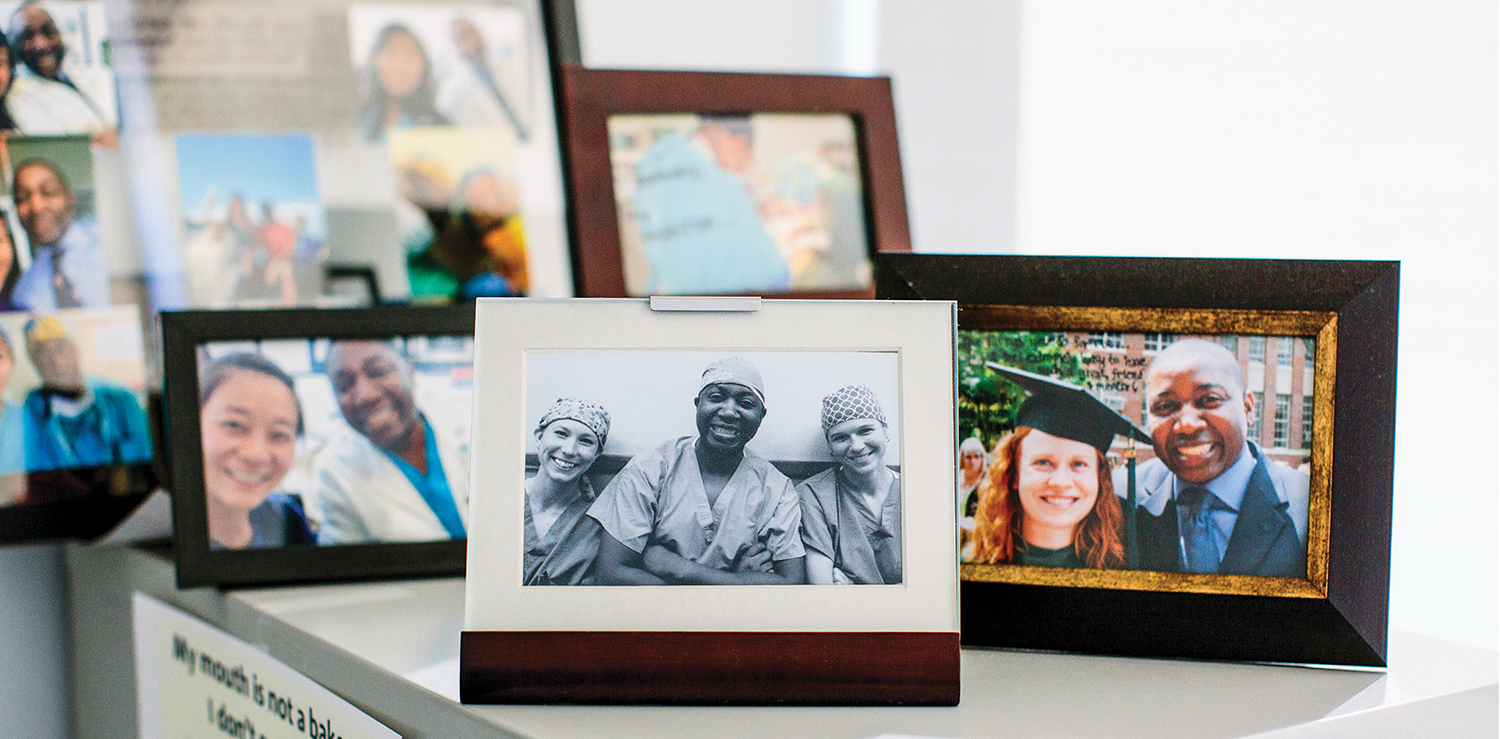
Charles’ corner room is filled with sunlight and photographs. (Photo by Anna Routh Barzin ’07)
His office at UNC’s School of Medicine is a corner room filled with sunlight and photographs. A large sketch of Nelson Mandela is displayed prominently. “I’m very passionate about justice and equality,” Charles said.
Snapshots of the trauma surgeon posing with students decorate the top of a filing cabinet.
Dr. Jennifer Doorey ’15 (MD), who’s in one photograph, was working as a research assistant to Charles, debating whether to go to medical school, when he invited her to go to Malawi.
“He’s a fierce advocate for all of his students and mentees,” said Doorey, now an OB-GYN resident at Thomas Jefferson University in Philadelphia. “I think everybody who has gone on a trip with him can start to see how you can fit this type of outreach into a normal life.”
When Doorey and her husband decided to elope in Mexico with a small group of friends, she turned to Charles to officiate. Now, in addition to his medical and public health degrees, he has a degree from the Universal Life Church.
“On a personal level, he’s light-hearted and jovial,” Doorey said. “Because his job is so serious, he balances that when he’s outside the operating room and outside that world.”
Another photograph bears a message from Dr. Lauren Raff ’11 (MD), who recently returned to UNC to join the surgery trauma team: “To Anthony, my mentor.”
“I always wanted to be like Dr. Charles, who can operate on anything from head to toe,” Raff said. She accompanied him to Malawi in 2011, an experience that gave her “such a perspective about modern medicine and all the resources we have here in the United States. It’s a really wonderful and unique experience all around, not only for the Malawi surgeons training there and the patients, but also for American medical students and surgery residents.”
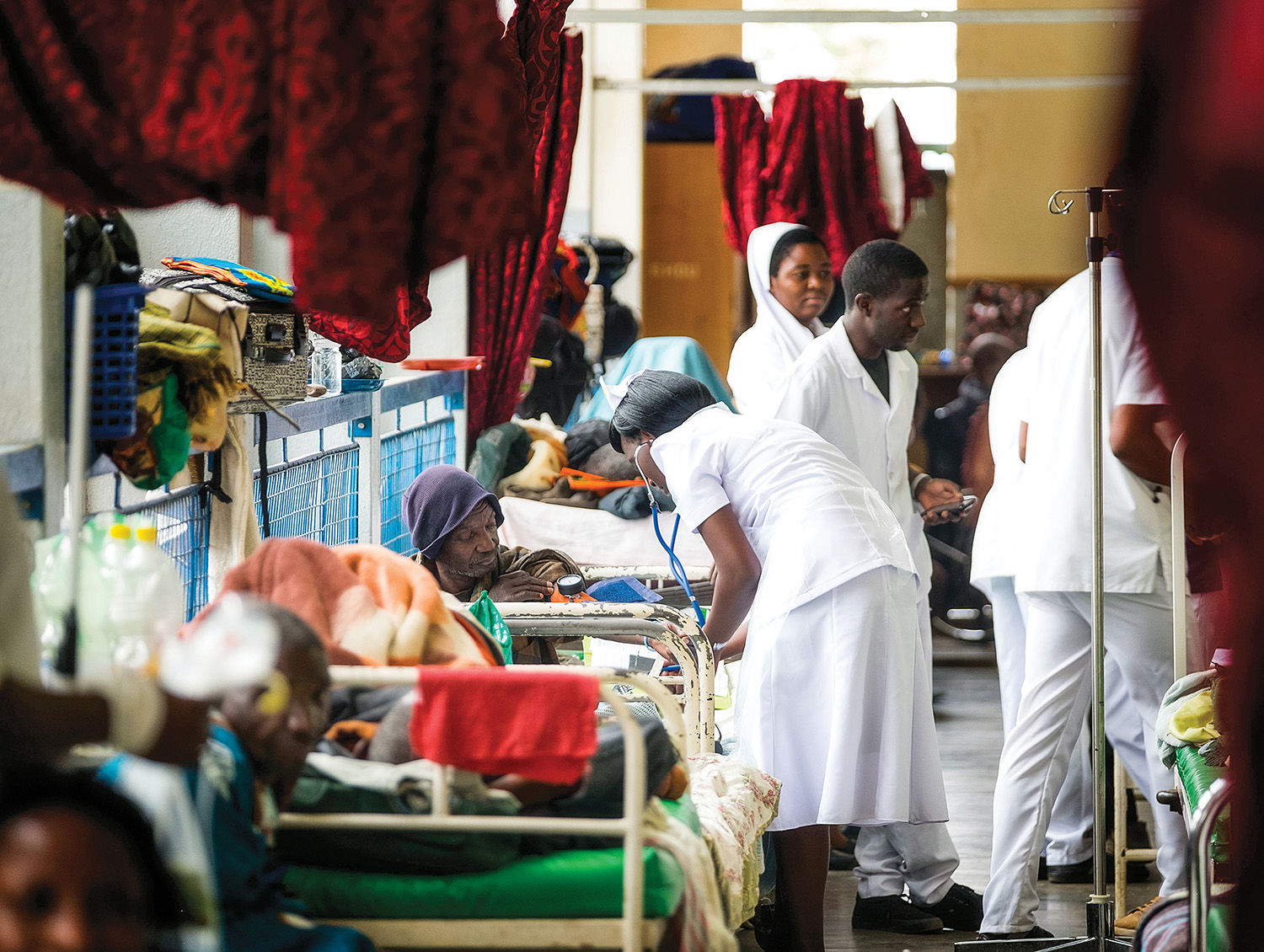
Once Malawi got a handle on the HIV epidemic, UNC began branching into other areas of medicine. Surgeons turned their attention to other trauma, including burns. (UNC photo by Jon Gardiner ’98)
Patient by patient
After his first trip to Kamuzu Central Hospital, Charles told his wife he expected to be involved for five years. Ten years later, he still makes the 30-hour trip once every quarter and plans to continue for the foreseeable future.
“We’re going to stay there, and we’re going to make a change,” he vowed. “This can only be achieved — not by us — but by the Malawians. We’re still strangers in that land.”
Patient by patient, surgeon by surgeon, his goal remains the same as it was in 2008: Help Malawi care for its own.
He recalled a burn victim, a girl about 18 months old, stoic and quiet, yet incredibly feisty, with large eyes that took in everything around her. She had pulled down a pot of boiling porridge over her head. Second-degree burns covered her scalp and a third of her body. Charles feared she wouldn’t survive. Without the new burn unit, he said, she likely would not have.
“It took a heroic effort, and a lot of people and just determination on our part and on the parents’ part. We grafted part of her scalp and part of her arms. We made sure that her nutrition was optimized, because without adequate nutrition you cannot heal.”
Six months later, the little girl walked out of the hospital alongside her mother, who had kept vigil throughout that time, sleeping beside her bed. The child’s face had been spared of burns, and the parts of her body disfigured by scars could be covered by clothing.
The Malawi Surgical Initiative gave her a second chance at life. That’s why Anthony Charles keeps going back.
Elizabeth Leland ’76 is a freelance writer based in Charlotte.
Thanks for reading the Carolina Alumni Review
Carolina Alumni members, sign in to continue reading.
Not yet a member? Become one today.
